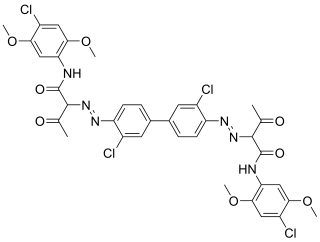Pigment yellow 83

| |
| Names | |
|---|---|
| Other names
Enceprint Yellow 1780, Homapol Yellow PO-227
| |
| Identifiers | |
3D model (JSmol)
|
|
| ChemSpider | |
| ECHA InfoCard | 100.024.491 |
| EC Number |
|
PubChem CID
|
|
| UNII | |
CompTox Dashboard (EPA)
|
|
| |
| |
| Properties | |
| C36H32Cl4N6O8 | |
| Molar mass | 818.49 g·mol−1 |
| Appearance | Yellow solid |
Except where otherwise noted, data are given for materials in their standard state (at 25 °C [77 °F], 100 kPa).
| |
Pigment Yellow 83 is an organic compound that is classified as a diarylide pigment. It is used as a yellow colorant.
The compound is synthesized from three components. Treatment of 2,5-dimethoxy-4-chloroaniline with diketene gives an acetoacetylated aniline. This compound is then coupled to the bisdiazonium salt obtained from 3,3'-dichlorobenzidine.[1]
References[edit]
- ^ K. Hunger. W. Herbst "Pigments, Organic" in Ullmann's Encyclopedia of Industrial Chemistry, Wiley-VCH, Weinheim, 2012. doi:10.1002/14356007.a20_371
